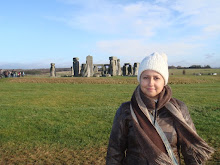Assinar:
Postar comentários (Atom)
skip to main |
skip to sidebar

Shall we have polemic (yet constructive) discussions as well as exchange information and experience of teaching and learning English as a foreign language? Welcome aboard!
Members
Useful sites
Arquivo do blog
Find out more about Maria Mizakami

- Maria Mizakami
- Londrina, Paraná, Brazil
- • Bachelor of Business and Administration (UEL – State University of Londrina - Brazil – 2005). Undergraduate in Foreign Modern Languages (UEL - Universidade Estadual de Londrina – Year 3)

According to Telma Gimenez's article, the notions of socialization and education are not only present in the beginning of teacher's career, but also when they are still acting like students, interacting and sharing practices with other teachers in teacher education programmes. This process of socialization happens most of the time in implicit ways, incorporated by the teacher starting their profession. But the process of learning how to teach doesn't occur only in the course, it's continuous. In this sense, teacher education programmes, as 'Letras" course, represents the phase in teachers lives that they're transiting between roles and changes, and the course, involving language learning and teaching, characterizes educational experience besides apprenticeship and it can be a context to the development of teacher's pedagogical awareness related to teaching and education.
ResponderExcluirSince socialization is defined as "the period which students interact with teachers in schools" I would say that this can be a valuable experience. Once the course provides this interaction which offers a window for observation, the students can gather all information and experience the practising teacher have and build their own performance.
ResponderExcluirI beleive the more important in our course about socialization is the experience the other people had and how wa can learn before the pratice.
ResponderExcluirThe things we can see observing other teachers and the way the each one use to teaching different kinds of people in a class
Miréia
I believe that is a two-way lerning process. The student teacher can verify in practice his believing and expectations about "how to be a good teacher" observing class, and this experience certainly will improve his perform as a teacher. And the teacher should see the observation like a oporunity of share ideas and suggestions moreover learn from each other.
ResponderExcluirI think the practise is the most important phase in the graduation. During this process the student can confirm certain beliefs that (s)he has from the classes during the graduation, or from his own experience as a student; or (s)he can also change some concepts acquired, sharing ideas and experience with other teachers or classmates. Therefore, observation and regency are the chances the student has to put in practise everything (s)he has learned from theory. This can be his first experience in teaching, but this process of changing oppinions and practise continues for all his life.
ResponderExcluirI agree with my classmates... practice is the most important thing in our area. Having contact with the students will easily help us to identify the problems they are facing at school and maybe these can help us to understand our position in the process of education. In our course we MUST have the opportunity to be touch with the reality that our country is passing through and we should try to make the difference by using what we have learnt in theory."Practice makes perfect" and in the society today, practice is something very useful when we need to deal with a lot of different people.
ResponderExcluirI agree with Evenly when she says that classes observations improve our skills, and it is an opportunity to generate ideas. but I also think on the fact that the former teacher beliefs and the previous knowledge may interfere the way some see the "LETRAS" course and the language teaching process. As Telma said
ResponderExcluir(...) course serves as an apprenticenship in teaching, as the prospective teachers develop their conceptualisations of teaching.(...)
But I also think that it can work on a negative way on the learning and teaching as weel as a benefit.
I think that our graduation course is fundamental in our learning-teaching formation since that it really interferes in our learning-teaching process, because when we're apprentices, we usually acquire certain methods or concepts that we think are the best ones (and lose others we thought were good), and in the other hand, we also acquire beliefs from teachers we identify ourselves. During this time, we develop our methodology based in the experiences of observation and regency we have. In this last scope, we face what Telma Gimenez says here "teacher education programmes represent a transitional phase in the lives of teacher, in which they are confronted with the need to change roles". Our previous knowledge about FLL/T, and the present one, will always be in change.
ResponderExcluirThe words of Telma Gimenez are perfect, in my point of view, when she says that the ‘letras’ course may serve as an apprenticeship in teaching but may not be the main shaper of teachers’ believes.
ResponderExcluirI consider that, all experience the student has in his learning period helps to form his way of thinking and teaching. Therefore it depends on what he has been influenced most and, it happens sometimes, through an unconscious selection of what he learns since he has his first experience with the teaching until his beginning as a teacher
The words of Telma Gimenez are perfect, in my point of view, when she says that the ‘letras’ course may serve as an apprenticeship in teaching but may not be the main shaper of teachers’ believes.
ResponderExcluirI consider that, all experience the student has in his learning period helps to form his way of thinking and teaching. Therefore it depends on what he has been influenced most and, it happens sometimes, through an unconscious selection of what he learns since he has his first experience with the teaching until his beginning as a teacher
wellington veiga